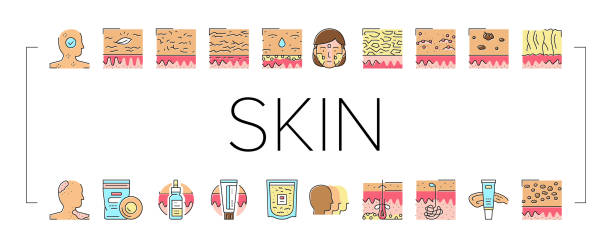What is Ceramide?
Ceramide is a lipid molecule that plays an important role in the structure and barrier function of the skin, such as preventing moisture loss and protecting against environmental damage. Although the body produces ceramides, levels in the skin decline with age.
When ceramide levels decline, it can lead to drier, more sensitive skin or other issues. However, people can take supplements or use skin care products that contain ceramides to replenish their levels. Some research suggests that these may help improve skin health.
What Do Ceramides Do?
Ceramide plays an important role in regulating cell differentiation, proliferation, apoptosis, aging and other life activities. Ceramide, as the main component of intercellular lipids in the skin stratum corneum, has the functions of maintaining the skin barrier, moisturizing, anti-aging, whitening and disease treatment.
Ceramide is essentially the glue that holds our skin cells together to keep our skin barrier intact and healthy. A healthy skin barrier helps seal in moisture and seal out harmful elements.
So Ceramides Are Key To Healthy Skin, Lower ceramide levels are linked to skin conditions such as acne, eczema, psoriasis and rosacea1. Sun exposure, harsh climates, and age also impact ceramide levels and can compromise your skin barrier function contributing to dry skin.

Benefits of Ceramide for Skin
Ceramides play an incredibly crucial role in the barrier function of the skin.
- Restores the skin barrier: A loss of ceramides, whether due to aging, the overuse of exfoliants and harsh soaps that strip the skin, or something else, causes a compromised stratum corneum—or the protective barrier of the skin—and allows bacteria to enter through tiny cracks and cause irritation. Replenishing those ceramides will keep the barrier healthy and functioning properly.
- Locks in moisture: A healthy skin barrier seals the moisture in and prevents water loss from occurring, which causes dry skin.
- Protects the skin: Ceramides work to protect the skin against environmental aggressors and pollution.
- It makes skin more tolerable to active ingredients: ceramides also work to protect from the chemicals that we put on our skin that tend to cause irritation.
- Softens and smoothes the skin: Common traits of a compromised skin barrier are dryness, flakiness, and fine lines from dehydration. Restoring lost lipids may increase skin hydration and improve the look and feel.
Maintains skin barrier
- The natural aging process and the overuse of harsh soaps or exfoliants can lead to ceramide loss in the skin.
- When ceramide levels decline, the stratum corneum or protective outer barrier of the skin becomes compromised, and tiny cracks can form. This breakdown in the skin barrier can make it easier for infection and skin inflammation to occur.
- Replenishing lost ceramides keeps the skin barrier healthy and functioning as it should.
Boosts hydration
- Ceramides can lock in moisture and boost hydration. When skin is dehydrated, it can become rough, and cracks can develop.
- Some studies by Trusted Source also suggest that using ceramide moisturizers in conjunction with acne treatment can help combat the dry skin and irritation these treatments cause.
- Increasing hydration also helps soften and smoothen the skin, which improves its overall look and feel.
Rejuvenates aging skin
- As people age, their skin changes as it loses structural proteins, such as collagen, elastin, and keratin. This, and the other processes involved in the degradation of the skin barrier, leads to thinner skin and visible signs of aging such as wrinkles, lines, and sagging.
- Ceramides have trusted Source water-retaining properties that prevent moisture loss from the skin. Hydrated skin can help minimize the appearance of fine lines and wrinkles, which are often more visible when the skin is dry.
- Ceramide creams can also stimulate the production of keratinocytes, which make keratin. The increase of keratin helps rejuvenate the skin barrier and reduce signs of aging.
Protects against UV damage
Exposure to sunlight and UV rays is responsible for 90% of the visible skin changes such as wrinkles, fine lines, and pigmentary changes. Dermatologists refer to this as photoaging, and it is the direct result of cumulative sun damage over a lifetime.
How to Use It
As a moisturizer, ceramides may work best when applied immediately following a shower to lock in extra moisture, suggests using the product before bed as well. And recommend applying your ceramides twice daily.
Potential side effects
Topical ceramides typically work well for most skin types, are safe for most people, and are not likely to cause side effects.
However, individuals should be aware that certain cosmetic products often contain multiple ingredients besides ceramides.
Therefore, as with any new addition to a skincare routine, performing a patch test before using it on a large area is good practice. This involves applying a small amount of product on an area of the skin and waiting 24 hours for any reaction.
